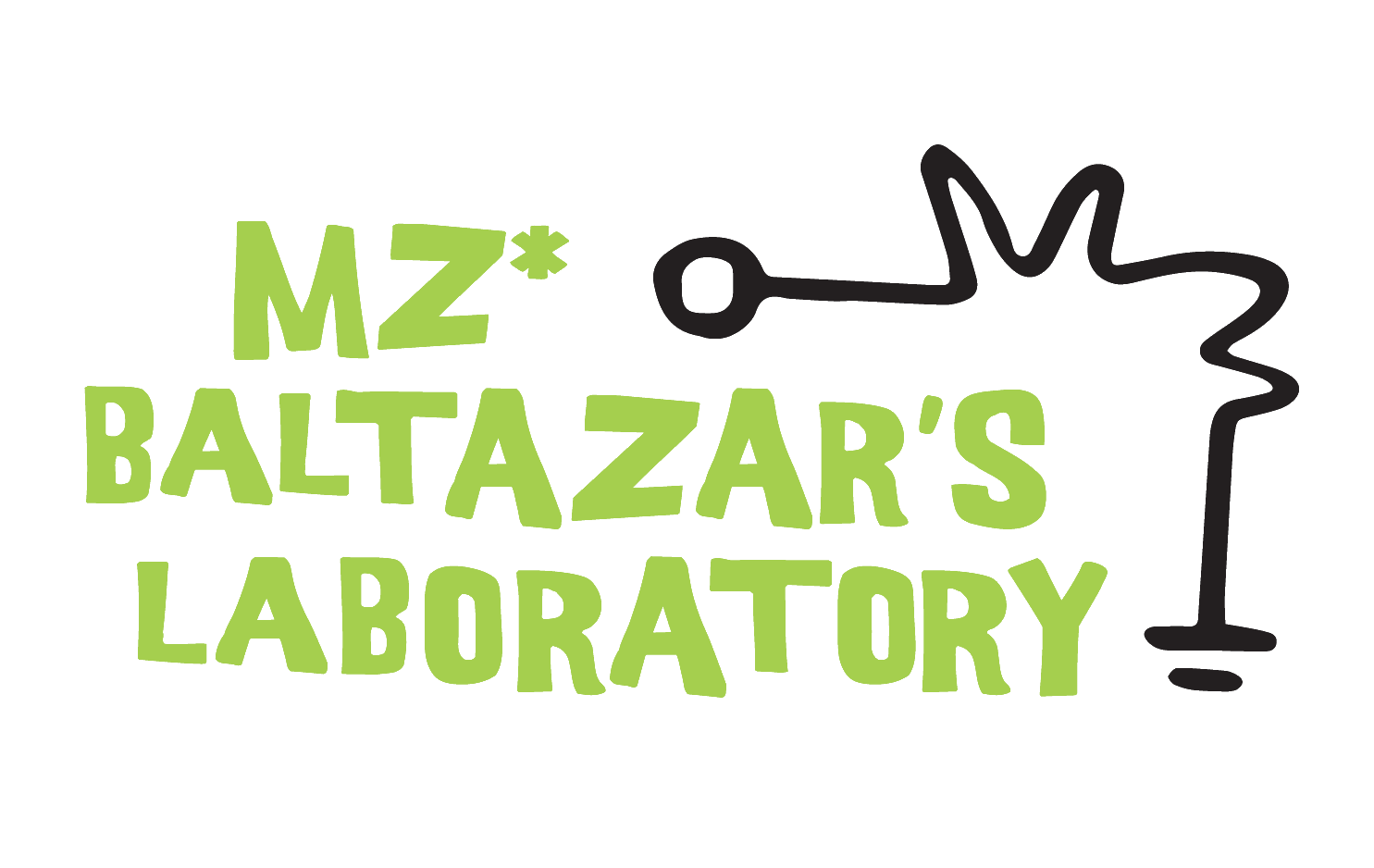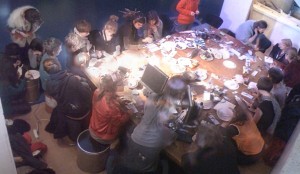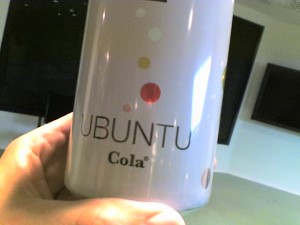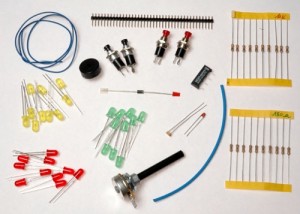Author: admin (Page 21 of 26)
Ein Workshop von Claudia Mongini
23. Februar, 19h Museumsquartier
In dem Workshop wird die ästhetische und politische Dimensionen Lazzarato’s Auffassung von Gehirn erforscht. Insbesondere geht es darum zu verstehen, dass jene Sichtweise eine Neuauffassung der Begriffe der Information und Kommunikation erfordert,
die letztendlich die Interaktion zwischen Mensch und Maschine von einem anderen Standpunkt her aufnehmen.
Es wird eine Panorama skizziert, in der synaptische Spalten und elektronische Schnittstellen in ihren generativen Potential und ihrer Plastizität erfasst werden, als differenzierte Bolzen eines komplexen kollektiven Gedächtnisses.
Das Gehirn macht also nichts anderes, als das fließen der Lichtströme fortzusetzen, zu transformieren.
Es ist in der universellen Variation enthalten, es schafft keine Bilder, es fügt den Dingen die Wahrnehmung nicht hinzu. Ganz im Gegenteil, seine Funktion ist es, der Bildmaterie das abzuziehen und zu erhalten, was für seine Bedürfnisse nützlich, für seine Handeln notwendig ist. […]
Das Gehirn ist nur in dem Sinne Schnittstelle, dass es eine Geschwindigkeit, eine Bewegung in eine andere übersetzt; eine Schnittstelle, die den unendlichen Fluss entsprechend der Erfordernisse unserer Aktivität übersetzt. Es ist der <> zwischen verschieden Graden des Wirklichen.
Maurizio Lazzarato, Videophilosophie – Zeitwahrnehmung im Postfordismus, Berlin 2002, 31-32
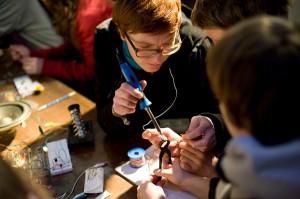
Feminist DIY Workshop
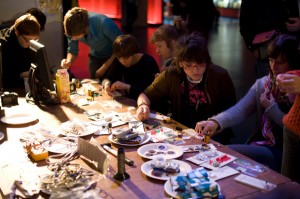
03.02.2011 10:30
04.02.2011 14:30
The workshop in Berlin was pure divine fun – many, many people got interested in our group and it was booked out already 3 weeks in advance.
There was a journalist from Berlin’s TAZ and a Missy Magazine writer participating and the guy who makes the Arduino blog took an interview. He promised to add the tag “arduina” to the arduino website. I think, we should all post our thoughts on the arduino forum more, to start a discussion on these issues.
A journalist from dpi magazine in montreal took part in the workshop and will write about us. Also a dutch online magazine took an interview and the karlsruhe institute of technology as well as the Frankfurt visual arts department of the Goethe-Universität would like to host mz baltazar’s laboratory workshops.
I also gave a lecture at the panel Access Denied – DI_Yourself
Participants: Carolyn Guertin (ca), Stefanie Wuschitz (at), Franca Formenti (it)
Moderation: Verena Kuni (de)
The lecture was on hackerspaces and women only groups within these frameworks. Here are some pictures from my slide show:




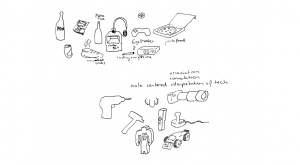
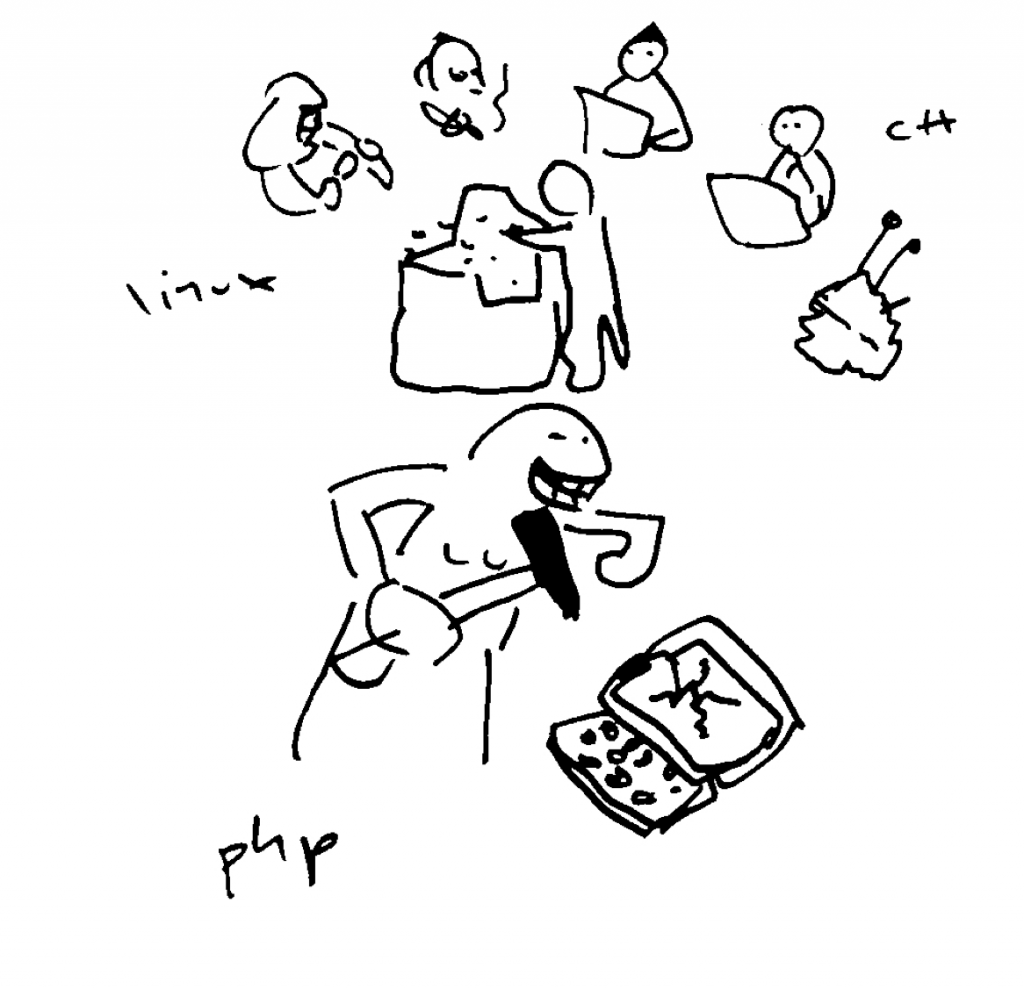
FM4 wants to do a radio report about mz baltazar’s laboratory, so they might even come to one of the next sessions. however, i really look forward to our linux (ubuntu) install session! if you want to change the operating system on your computer, please make sure to make a backup of all your data in advance! so i hope i see many of you on the 9th of february at 7pm at museumsquartier!
love,
stefanie
if you always wanted to try out linux on your computer or if you want to install it even or if you just want to know more about it and ask some questions or tell us what you think.come to the Mz B’s Lab Linux Install Party.it will take place at museumsquartier again on wednesday : : : : feb 9th : : : : : at 7pm
Mz Baltazar’s Laboratory im Februar verspricht eine Party 🙂 Wenn du schon immer mal Linux ausprobieren wolltest, oder vielleicht sogar installieren, oder informationen darüber hören wolltest oder fragen dazu hast oder was zu sagen…Dazu gibt’s zeit und raum auf der Mz B’s Lab Linux Install Party…findet statt wieder im museumsquartier am mittwoch den : : : : 9. februar : : : : : um 19.00
keine vorkenntnisse nötig – wir freuen uns auf euch
helga
Feminist DIY Workshop
Start: 03.02.2011 10:30
End: 04.02.2011 14:30
Mz Baltazar’s Laboratory wants to demystify technology. In a two-day workshop we hack hardware, make noise, build angst-robots and programme Open Source software. We ask a lot of ‘stupid’ tech questions and develop art projects together. No one is an expert, no one is only student, we share our equipment and knowledge in order to articulate ourselves through high-tech in novel ways. Mz Baltazar’s Laboratory offers women space to make their own electronics and realise interactive art projects.
For 15 participants
With pre-registration only
since we are researching for ways to play with the ars electronica LED fassade, theresa schubert has sent us this video of an artist’s application called iRiS:
iRiS – http://project-iris.org/ from awiethoff on Vimeo.
CONCEPT DRAFT ARS ELECTRONICA FASSADE
by Miss Baltazar’s Laboratory 2011
Our collective develops a game that can be played via smart phone.
The project is targeted to people passing AEC, who are present in the public space around the AEC fassade and enables players to immediately interact with the system. Real time effects of the user’s interaction create a meaningful dynamic between choices players take on their mobiles and what is visually displayed on the fassade.
The structure of the mobile game is challenging players to find a balance between accumulations and deprivation, fostering generative growth of visual algorithms as much as the intentional sudden destruction of these visual structures. Rather than accumulating and gaining, the game is about creating tactically smart win-win situations through mutually caused, non-linear, osmotic processes. The player can control these processes via an interactive animation on the mobile phone screen (html, PhP, MYSQL). In order to “succeed” in the game, the biological patterns accumulating and taking over the fassade through the player’s interaction, similar to certain kinds of bacteria, must be at the same time mastered/regulated into a fluctuating movement. Once the users have collaboratively managed to create this kind of stable and fluctuating balance the game is won.
The aim of the game is to explore methods of redistributing values in a dynamic system and the intermittency between biological creation (evolutiono famoebae) and code (network) structure.
About Miss Baltazar’s Laboratory:
Mz Baltazar’s Laboratory offers women a space to make electronics their own and realize interactive art projects. In workshops and temporay collaborations women artists share their skills on Open Source Software and Hardware, hack, solder and make noise. Our activities are taking place on a regular basis at MQ in Vienna, but are also travelling to international institutions and festivals (e.g. Transmediale in Berlin, ISEA 2011 in Istanbul).
http://mzbaltazarslaboratory.org/
Artists involved: Christine Schörkhuber. Claudia Mongini. Delphine Mei. Stefanie Wuschitz. Theresa Schubert.
Mz Baltazar’s Laboratory BLINK from MzBaltazarsLaboratory on Vimeo.
first steps made with arduino

Delphine Mei took some pictures of us:

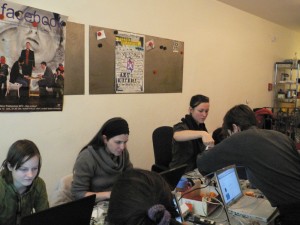




i hope 2011started out well for all of you! our first meeting in this new year will take place at museumsquartier again on wednesday : : : : jan 19th : : : : : at 7pm!
we will do an arduina introduction to try out the 10 arduino starter kits we recently bought, plus the crispy new servo motors and super fresh sensors! the workshop is for total, absolute, bloody beginners, don’t be shy! we will just tinker around and find out what’s possible to make and invent with these electric little friends. please come in time and bring a laptop if you have one available! if you have never used arduino before, please download the arduino environment from: http://arduino.cc/en/Main/Software For those who wanna know more about the tool “arduino” check out the documentary: on vimeo later we will talk about a new project that might be in collaboration with the interactive facade of linz’ ars electronica center.
hope to see you all there!
love,
stefanie
Dear Miss Baltazarians,
Being so enormously nice this year (all of us) we got lots of presents.
Today the mail man brought:
- Ten Arduino Starte Kits containing breadboards, senors, wires, USB cables, Arduino Uno, LEDs and resistors
- An accerometer measuring acceleration and movement
- Five servor motors for tinkering crazy stuff
